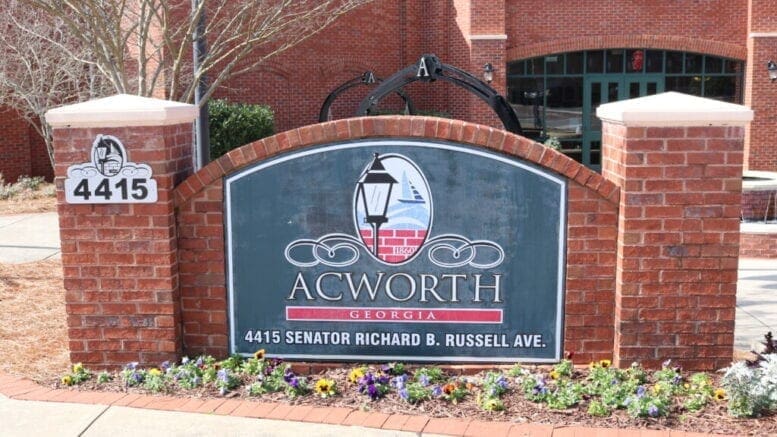Acworth’s Board of Aldermen unanimously approved adjustments to power and environmental costs at their biweekly city council meeting Thursday evening.
Both the electrical power rates and Environmental Compliance Cost Recovery rate will be increased beginning around Jan. 1, 2021.
The electrical power rate is being raised in light of Plant Vogtle coming on line next year.
Because of the adjustment in the electric rate, the monthly ECCR will be adjusted to 0.0016 cents per kilowatt-hour to line up with the power adjustments. The current ECCR is .00136,
Acworth Director of Public and Power Works Angie Luna clarified in an email after the meeting.
Years ago, the city of Acworth enacted the ECCR to help recover costs from environmental compliance regulations.
Normally, ECCR adjustments happen annually on July 1, which is the beginning of a new fiscal year. But the coming of Plant Vogtle has caused the adjustment to happen sooner — next month.
Board member Tim Houston said he had a message from some people from the city’s Department of Power and Public Works to the board.
“They wanted me to relay to y’all their appreciation for the increase,” Houston said. The Power and Public Works department thanked the board for their decision.
At a work session the city held on Oct. 26, city staff and an official from Electric Cities of Georgia went in-depth about the power rate adjustments that will occur next month for the next four years.
The October meeting and the city’s rate adjustment plans
The following is from the work session that happened on Oct. 26.
“In the year 2002, mayor and board made a decision to put away funds to address the costs that would be associated with participating in the purchase of expansion for power,” Luna said. “As you know, we have participated in the Vogtle plant expansion which will be coming into use in 2021.”
Luna said that the board set aside $8.7 million in a savings account with the intention of minimizing the impact of rate adjustments the city must make to address the difference in costs when power costs went up due to Plant Vogtle.
Luna said city staff has been working with ECG Director Chau Nguyen and other ECG analytical services members to develop rate adjustments that would use the $8.7 million set aside to close the discrepancy between the rate and rise of costs.
“Additionally, we want to address the discrepancy that we currently have where the current revenues, the balance of the fixed vs. variable costs are not brought in in the same matter as we have to pay for them,” Luna said.
The proposed strategy would leverage Acworth’s savings account to adjust power rates between 2.2 and 2.5 percent per year from 2021 through 2024 to meet the city’s power costs needs. The other goal is to work toward balancing the collection of revenues for the fixed and variable costs.
The strategy would start to be put in place January 2021.
Nguyen said the rate adjustment plan proposed is a necessity, the reason being that the city must have enough revenue to pay for other expenses going forward.
Nguyen said Vogtle plants three and four come on line in fiscal years November 2021 and November 2022.
Cost projections were provided by MEAG Power.
The projected purchase power costs for the city, in cents per kilowatt-hour, in 2020 is about seven cents per year. The projected purchase power costs begin to decline in 2023 but then increase again.
“Beginning in the calendar year 2023 is when you will realize the full cost of both units [units being Vogtle plants] being on line, so you see a peak right there,” Nguyen said. “And then gradually … the costs hover around 10 cents [per kWh per year] and then go back down to roughly about mid nine to low nine cents [per kWh per year] as we proceed until 2030.”
City Manager Brian Bulthuis said Acworth is trying to get back to an annual projected power purchase cost of 9.34 or 9.35 cents per kWh, which the city was at in 2012-13.
Nguyen also said if there is no action taken on the rates then the city’s municipal competitive trust will exhaust by 2025.
“What that would mean is there’s going to be a $2.4 million revenue shortfall and at that point, you either raise rates or you have to find some other means to come up with that money,” Nguyen said.
Effective Jan. 1, 2021, Nguyen and city staff’s proposal is a four-year rate adjustment. The MCT savings fund will also be utilized to bridge the gap between the city’s revenues and expenses.
“Our base rate [for electrical power bills] is $15 [per month],” Bulthuis said. “You want a fixed base — you’ve got to supply certain power regardless and the industry in over the last 100 years has done it the way we’ve done it but … we want a stronger base rate, so that’s what we’re attempting to do is switch from 8 percent of our rate being base to 14 percent.”
Nguyen said the base rate is a customer service fee.
Additionally, Nguyen said the city currently has a monthly $8.45 base charge for the minimum electrical power bill. The minimum bill is $15 a month.
Staff proposed increasing the base charge gradually so it will go from $8.45 a month to $12 a month in 2021, then $12 to $14 in 2022, $16 in 2023 and $18 in 2024.
The minimum monthly bill would go from $15 to $16 in 2021, $17 in 2022, $19 in 2023 and $20 in 2024, Nguyen said.
“The other part is that we still have to adjust your [purchase power] rates so that there’s sufficient revenue that will come in and here’s the change we are making,” Nguyen said. “Nine cents [per kWh per year] to 11.9 [cents] to 12 [cents] and so forth.”
Bulthuis said the base rate charge affects lower power users more than high power users and so he and staff took a conservative approach in this matter.
In the summer, the current monthly power bill for lower users is $72.01 and will go up to $75 in the first year.
For 500 kWh used by a resident each month, there is a proposed 4.6 percent increase annually.
Someone who uses 1000 kWh a month would see a 2.2 percent increase, 1500 kWH a 1.3 percent increase and for 2000 kWh a .9 percent increase.
“Why are the lower end users affected more than the other users?” Board member Tim Richardson asked.
“If you have a user that just wants to use 1 kWh and the bill is $100 that’s a dollar per kWh,” Nguyen said. “But if you start using more, say 10 kWh, then $100 divided by 10 is just 10 cents.”
Essentially, the more volume of power a customer uses, the more one’s power cost average will decrease.
For a resident using the medium amount of power in the summer months of June through roughly September — 1264 kWh — the current monthly bill is $192.38.
With the rate adjustment, in the first year the summer bill will be $195.57 per month, the second year $199 per month, year three $203 per month and year four $207 per month.
In the winter months, October through May, the medium usage is 822 kWh per month and so those power bills will go from $119 per month currently, to $123 per month in 2021, to $126 in 2022, to $129 in 2023 to $133 by 2024.
For mom and pop type shops, the base charge will go from $15 per month up to $25 per month by 2024.
For large grocery and retail stores, the base charge would go from the current monthly charge of $35 to $50 by 2024.
Apartment complex base charges would go from $31 to $45 monthly by 2024.
Small retail stores like Dollar Tree and CVS currently pay $1983.86 for their power and by year four, the proposal would be to pay $2138.56.
Large retail stores like Walmart and Target currently pay $33,458 a month for power and by year four pay $35,960 monthly.
On average, there would be about a 2.25 percent increase in power rate adjustments per year each year through 2024, Allegood and Nguyen clarified.
Mayor Tommy Allegood then asked Nguyen what would happen in 2025.
Nguyen said in 2025 an assessment will be made to ensure the city still has sufficient revenue going forward.
Luna also said by 2025, with current rate projections, the city has adjusted the power rates enough to make up for power plant costs going forward.
Luna told Allegood staff would study these adjustments every year to 2025.
“If we find, that hey, we’re doing really well, the rate hasn’t gone up as much as we have thought it would be projected, we would use the power cost adjustment to lower the rate,” Luna said. “If we find that things have gone through the roof and something big happened, [an example being] yes, fracking was no longer happening, then we could still use that power cost adjustment as needed to balance our budget and pay our bills. But ideally, by 2025 we will have gotten to a rate that will cover our costs moving forward.”
By 2024, the purchase power costs go up to 10.41 cents per kWh but after 2025-26, the cost balances back down to around 9 cents, so rates will not have to be hiked that much in the later years of the decade, she said.
Rather than having to increase rates by a large portion to account for the 10.41 cents in that one year, it would be better for the residents if the rate increases occurred progressively throughout the coming years, Luna told the board.
Houston also reminded the board that these adjustments were inevitable and the city does not have many other options.
Board member Brett North suggested being more aggressive with raising the base rate than the minimum power bill rate, as the base rate is where revenue comes from. He suggested that the minimum go up by two dollars a month.
“My personal opinion is we match the base and minimum,” Richardson said. “There’s no reason they should be separate but I think changing the base that much hurts a lot of lower-income users.”
Board member Gene Pugliese said he thought the base increase would be a significant change to people’s bills because the proposed base rate is essentially double the price.
The board agreed to match the base and minimum and make the minimum $17 a month, up $2 per month.
Allegood emphasized that the board would review these changes every year. He directed staff to prepare an ordinance about the adjustments.

Arielle Robinson is an undergrad at Kennesaw State University. She is the president of the university’s Society of Professional Journalists and an editor at the KSU Sentinel. She enjoys music, reading poetry and non-fiction books and collecting books and records.

Thanks for the coverage!
So this is why my utility bill has tripled! Unbelievable. You decided to raise the rates at a time like this? Shame on you.